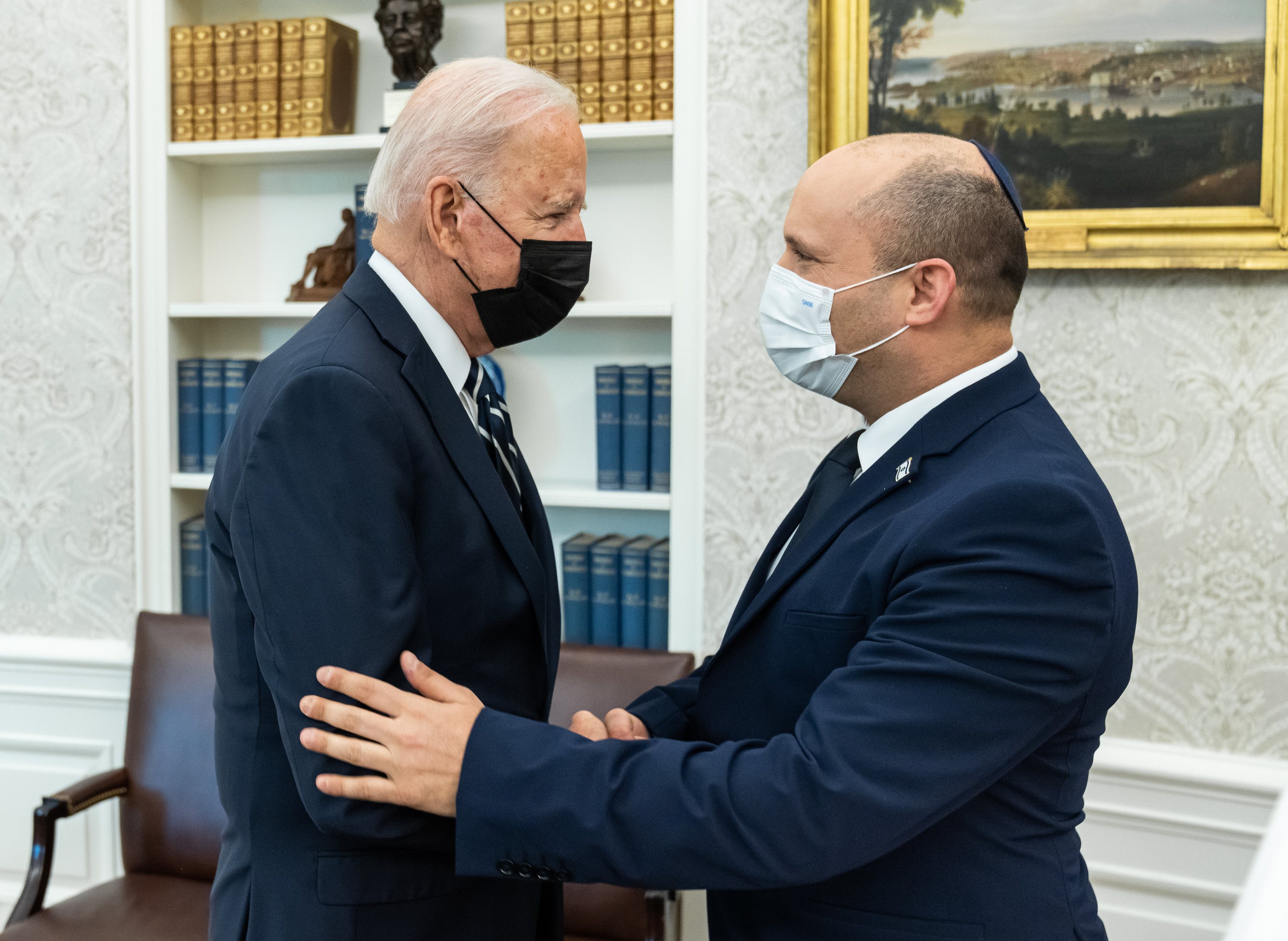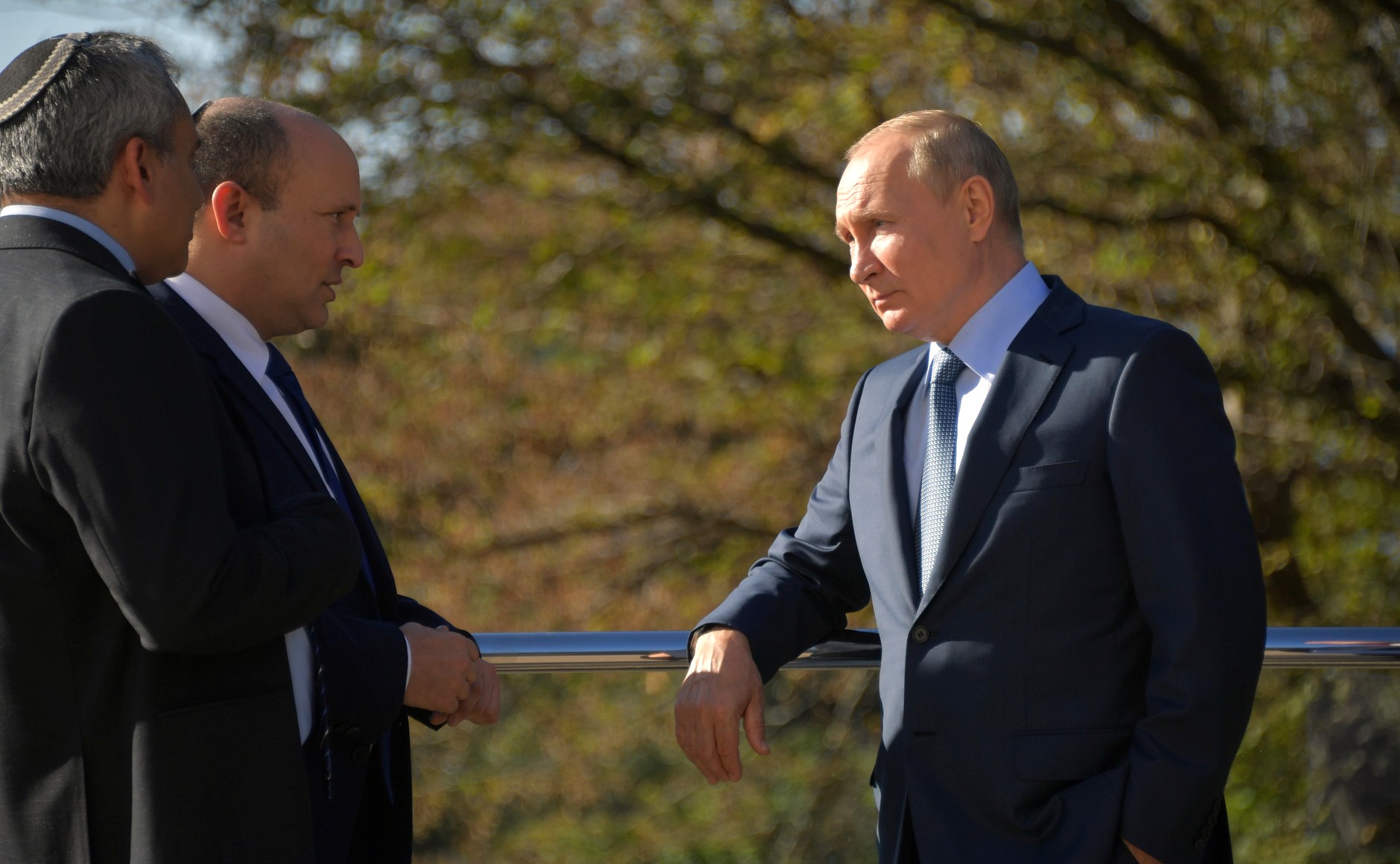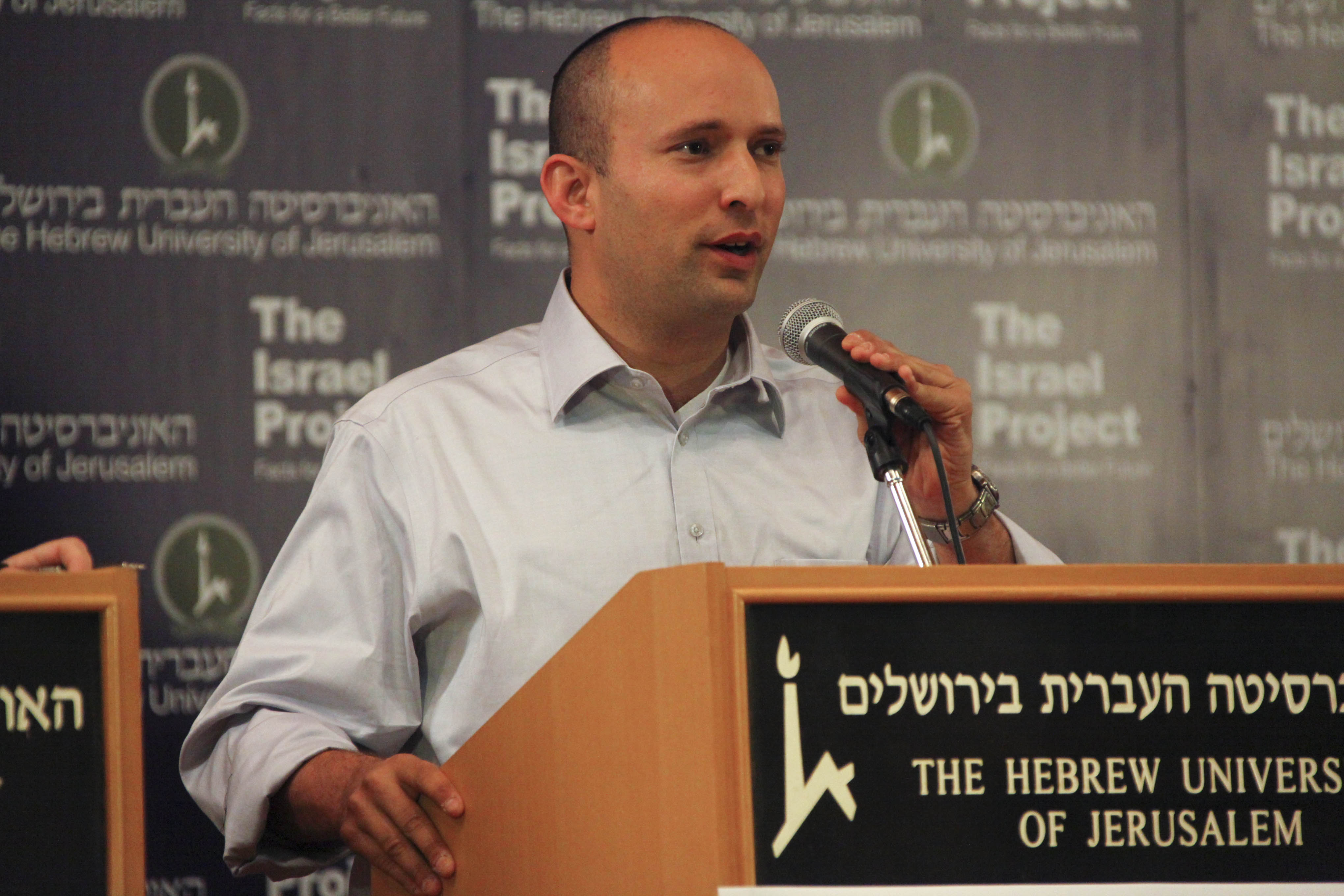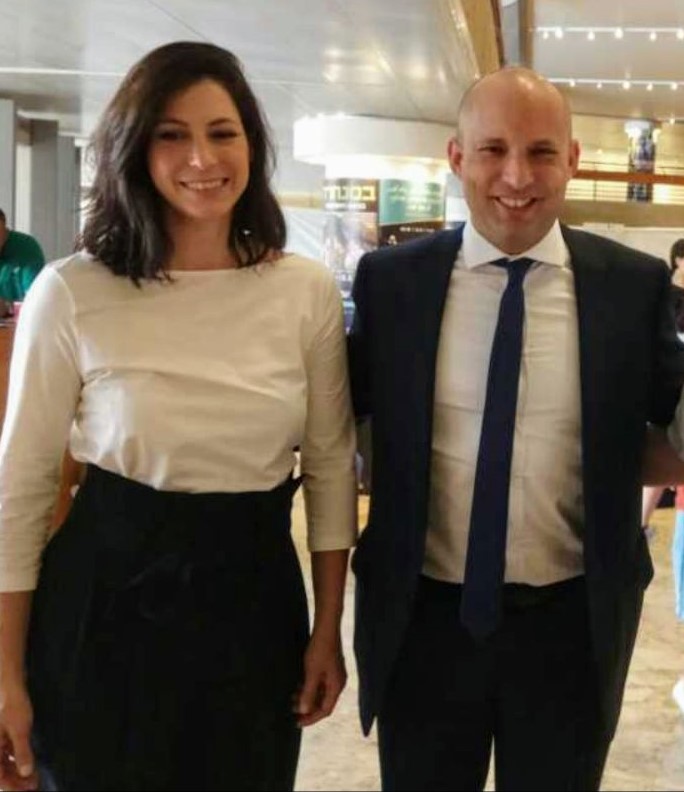1. Early Life and Background
Naftali Bennett's early life was shaped by his American-Jewish immigrant parents and a childhood that spanned both Israel and the United States, instilling in him a unique cultural background before his distinguished military and business careers.
1.1. Family and Childhood
Naftali Bennett was born on 25 March 1972, in Haifa, Israel, the youngest of three sons to Jim and Myrna (née Lefko) Bennett. His parents, both American Jews from San Francisco, had made aliyah to Israel in July 1967. They came from Ashkenazi Jewish backgrounds, with his father's ancestors hailing from Poland, Germany, and the Netherlands, including Julius Salomonson, who arrived in San Francisco in 1851 during the California Gold Rush. His mother's family, from Russia and Poland, immigrated to the United States before World War II, with some relatives who remained in Poland perishing in the Holocaust.
Initially raised in non-Orthodox Jewish homes, Bennett's parents were progressive activists in the 1960s; his father was once arrested during an anti-racism sit-in. They later adopted Modern Orthodox Judaism and embraced right-wing Israeli politics. After settling in the Ahuza neighborhood of Haifa, Jim Bennett became a successful real estate broker and entrepreneur, while Myrna Bennett served as the deputy director general for the northern region of the Association of Americans and Canadians in Israel.
In 1973, when Bennett was one year old, his family briefly returned to San Francisco at his mother's behest. However, with the outbreak of the Yom Kippur War in October 1973, his father returned to Israel to fight in the Israel Defense Forces on the Golan Heights. Following the war, the rest of the family rejoined him, and they decided to permanently reside in Israel. In 1976, at the age of four, Bennett's family moved to Montreal for two years due to his father's job. Upon their return to Haifa, he attended Carmel elementary school. During his second grade, they relocated to Teaneck, New Jersey for two years, where Bennett attended Yavneh Academy, before finally returning to Haifa when he was ten. His elder brothers are Asher, a businessman in the United Kingdom and a former Israeli Navy submarine officer, and Daniel, an accountant for Zim Integrated Shipping Services. Bennett attended Yavne Yeshiva High School in Haifa and was a group leader (madrich) in the religious Zionist youth movement Bnei Akiva.
1.2. Education
After completing his mandatory military service in the Israel Defense Forces, Naftali Bennett pursued higher education, earning a law degree from the Hebrew University of Jerusalem.
1.3. Military Service
Naftali Bennett served with distinction in the Israel Defense Forces (IDF), participating in multiple conflicts and holding command roles in elite units. However, his service also included a highly controversial incident that drew international scrutiny.
1.3.1. Units and Early Service
Bennett was conscripted into the Israel Defense Forces in 1990. He served in the elite Sayeret Matkal commando unit, known for its deep reconnaissance and counter-terrorism operations. After his initial service, he was selected for officer training. Opting for a command position over remaining a regular operator in Sayeret Matkal, he transferred to the Maglan commando unit, where he became a company commander. During his six years of active service, Bennett participated in operations during the First Intifada and within the Israeli security zone during the 1982-2000 South Lebanon conflict. He commanded numerous operations, including a notable role as an officer in Operation Grapes of Wrath.
1.3.2. Controversies During Service
One of Bennett's actions as a commando officer during Operation Grapes of Wrath in 1996 became a significant controversy. While leading a force of 67 Maglan soldiers in southern Lebanon, his unit came under mortar fire. Bennett radioed for support, after which the IDF launched an artillery barrage to cover his force. The shelling, however, inadvertently struck a United Nations compound in which Lebanese civilians were seeking refuge, an incident that became widely known as the Qana massacre. A total of 106 Lebanese civilians were killed in the strike.
The incident provoked widespread international condemnation and contributed to diplomatic pressure that led Israel to conclude Operation Grapes of Wrath earlier than planned. Journalist Yigal Sarna, writing in the Israeli national tabloid Yedioth Ahronoth, asserted that Bennett displayed "poor judgment" during the operation. Sarna alleged that Bennett "decided to ignore orders and change operational plans, without coordinating these moves with his superiors, who in his mind were cowardly, and not steadfast enough. Near the village of Kfar Kana, Bennett's troops were caught in an ambush," leading to the civilian casualties.
Journalist Raviv Drucker, citing a "senior army figure," further claimed that Bennett's radio call for support was "hysterical" and directly contributed to the loss of life. In response, Bennett vehemently defended his actions, stating: "I have now been subjected to an attack claiming that I am 'responsible for the massacre in Kfar Kana.' Heroism will not be investigated. Keep looking in the archives. My military file is available for viewing, and it's waiting for you." Former members of Bennett's unit supported him, writing a letter that praised his leadership in "many successful operations that led to the elimination of Hezbollah terrorists deep in enemy territory." Other officers involved in the operation, including his deputy during the Qana incident, also denied that Bennett had altered plans without proper consultation with his superiors.
1.3.3. Reserve Duty
After his active service, Bennett continued to serve in the IDF reserves, attaining the rank of major. Even while living in the United States and developing his software career, he frequently returned to Israel for reserve duty. During the Second Intifada, he participated in Operation Defensive Shield. In 2006, he was called up as a reservist in the Maglan special forces unit during the 2006 Lebanon War, participating in a search and destroy mission behind enemy lines targeting Hezbollah rocket launchers. In October 2023, following the outbreak of the Israel-Hamas war, Bennett again enlisted for reserve duty, serving in the emergency storage unit of the IDF's Technological and Logistics Directorate.
1.4. Business Career
Following his military service, Naftali Bennett transitioned into the technology sector, achieving significant entrepreneurial success by co-founding and leading multiple software companies to profitable acquisitions.
In 1999, Bennett co-founded Cyota, an anti-fraud software company, and served as its CEO. The company specialized in combating online banking fraud, e-commerce fraud, and phishing. In 2000, he relocated to New York City, residing on the Upper East Side of Manhattan for four years to oversee Cyota's corporate development. In 2005, Cyota was acquired by RSA Security for 145.00 M USD, a transaction that made Bennett a multimillionaire. A key condition of the deal ensured that Cyota's Israeli operations remained intact, and as of 2013, approximately 400 Israelis were employed at the company's offices in Beersheba and Herzliya.
In 2009, Bennett became the CEO of Soluto, an Israeli technology company that provided cloud-based services for remote support of personal computers and mobile devices. During his tenure, he and his partner Lior Golan were actively involved in fundraising for various Israeli tech startups. Soluto had successfully raised 20.00 M USD from investors, including prominent venture capital firms such as Giza Venture Capital, Proxima Ventures, Bessemer Venture Partners, Index Ventures, Michael Arrington's CrunchFund, and Eric Schmidt's Innovation Endeavors and Initial Capital. The sale of Soluto to the American company Asurion was finalized in October 2013, reportedly for 100.00 M USD to 130.00 M USD.
In June 2021, Forbes Israel reported that Bennett was projected to earn 5.00 M USD from his investment in Payoneer, an American fintech company. Bennett had invested several hundred thousand dollars in Payoneer before entering politics. The company was slated to list on the Nasdaq stock exchange with a 3.30 B USD valuation, following a SPAC merger with FTAC Olympus Acquisition Corp in February 2021.
2. Political Career
Naftali Bennett's political career began in the mid-2000s, marked by his swift ascent from a chief of staff role to a key figure in Israel's right-wing political landscape, eventually culminating in his premiership.
2.1. Early Political Involvement (2006-2012)
Bennett first entered the political arena in 2006, serving as Chief of Staff for Benjamin Netanyahu, who was then the Leader of the Opposition, until 2008. From 2010 to 2012, he took on the role of director of the Yesha Council, an umbrella organization representing Israeli settlements in the West Bank, during which he actively opposed the 2010 settlement freeze.
In April 2011, alongside Ayelet Shaked, Bennett co-founded My Israel, an extra-parliamentary movement that aimed to bolster Zionism among center-right supporters, foster dialogue between religious and secular communities, and promote "The Israel Stability Initiative." He later founded another movement in April 2012, named Yisraelim ("Israelis"), with similar objectives focused on national unity and promoting his stability plan for the Israeli-Palestinian conflict. In November 2012, Bennett was elected as the leader of The Jewish Home party, a religious Zionist political party.
2.2. Knesset Member and Ministerial Roles (2013-2021)

Following his election as The Jewish Home party leader, Bennett secured a significant victory in the 2013 Israeli legislative election, where the party won 12 out of 120 seats in the Knesset, marking his entry into parliament. Before taking his seat, he had to renounce his U.S. citizenship, which he held by virtue of his American parentage.
In March 2013, he was appointed Minister of Economy and Minister of Religious Services in Benjamin Netanyahu's government. In April 2013, he also received the portfolio of Minister of Jerusalem and Diaspora Affairs. As Minister of Economy, Bennett spearheaded a strategic shift to reduce Israel's trade dependence on the European Union by expanding commerce with emerging markets in Asia, Africa, and South America. This included opening new trade attaché offices in these regions and initiating free trade negotiations with countries like Russia, China, and India. He also implemented reforms aimed at lowering Israel's high food prices by reducing import duties and promoting market competition, although some critics attributed subsequent price drops to global commodity trends and consumer financial distress rather than his reforms. He also championed efforts to integrate Haredi men and Israeli-Arab women into the workforce, believing it crucial for economic growth.

After being reelected in the 2015 Israeli legislative election, Bennett was appointed Minister of Education, retaining his Diaspora Affairs portfolio. As Education Minister, he controversially issued an official order prohibiting school principals from inviting members of "Breaking the Silence" and other organizations critical of Israel's military conduct in the West Bank. In October 2015, he temporarily resigned from the Knesset under the Norwegian Law, allowing another party member to take his seat, but returned in December of the same year.
In November 2018, after Avigdor Lieberman resigned as Defense Minister, Bennett sought the position for himself. However, Netanyahu rejected his request and assumed the role, leading to Bennett's Jewish Home party threatening to withdraw from the coalition, though he later reneged on this pledge. In December 2018, Bennett and Ayelet Shaked left The Jewish Home to form the breakaway New Right party, aiming for a partnership between secular and religious factions.
In the April 2019 Israeli legislative election, the New Right narrowly failed to cross the electoral threshold, causing Bennett to lose his Knesset seat. In June 2019, Netanyahu dismissed him from his ministerial posts. However, in anticipation of the September 2019 Israeli legislative election, the New Right formed an electoral alliance, Yamina, with The Jewish Home and National Union-Tkuma, securing seven seats and allowing Bennett to regain his Knesset position. In November 2019, he rejoined Netanyahu's government as Minister of Defense. The Yamina alliance briefly dissolved but reunified in January 2020 for the 2020 Israeli legislative election, with Bennett taking over as its leader. Yamina secured six seats in that election.
In May 2020, as negotiations for a new government between Netanyahu and Benny Gantz progressed, Yamina opted to enter the opposition, ending Bennett's tenure as Defense Minister. On 20 January 2021, the Religious Zionist Party formally split from Yamina. Despite this, Yamina, under Bennett's leadership, won seven seats in the 2021 Israeli legislative election in March.
2.3. Prime Minister of Israel (2021-2022)
Naftali Bennett's premiership marked a significant political shift in Israel, leading a government formed through unprecedented coalition agreements.
2.3.1. Formation of Government
Following the 2021 Israeli legislative election, which resulted in a deadlock, Naftali Bennett, then leader of the Yamina party, played a pivotal role in forming a new government to unseat long-serving Prime Minister Benjamin Netanyahu. On 9 May 2021, reports indicated substantial progress in coalition talks between Bennett and Leader of the Opposition and Yesh Atid leader Yair Lapid. On 30 May, Bennett publicly announced his intention to form a rotation government with Lapid, under which Bennett would serve as prime minister until August 2023, with Lapid then assuming the role until 2025.
The coalition, known as the "change government," was an ideologically diverse alliance comprising eight parties, including right-wing (Yamina, Yisrael Beiteinu, New Hope), centrist (Yesh Atid, Blue and White), left-wing (Labor Party, Meretz), and notably, the Arab-Islamist party Ra'am. This diverse bloc ultimately secured a narrow majority of 61 seats in the 120-member Knesset. On 13 June 2021, Bennett was sworn in as Israel's 13th Prime Minister, ending Netanyahu's 12-year tenure. He became Israel's first prime minister to regularly wear a kippah.
2.3.2. Domestic Policy and COVID-19 Response
Upon assuming office, Bennett's government inherited a relatively subsided COVID-19 pandemic in Israel, with a low national infection rate and a high percentage of the population having received two vaccine doses. However, within ten days of his premiership, Israel faced a new outbreak driven by the Delta variant. In response, Bennett encouraged renewed social distancing measures and advocated for the vaccination of all children aged twelve and above. His administration secured an agreement with Pfizer to accelerate the delivery of pre-purchased vaccines and to ensure additional supplies for potential booster shots. On 1 August 2021, a second booster shot (third overall) was approved for individuals aged 60 or older, a measure extended to all adults on 29 August.
A subsequent surge in COVID-19 cases began in late November 2021 with the emergence of the Omicron variant. The government reacted by imposing restrictions on international air travel and promoting vaccination among children and teenagers. By 2 January 2022, a third booster shot (fourth overall) was approved for individuals aged 60 or older and medical teams. While cases peaked in January, they steadily declined, stabilizing by March. Israel eventually lifted its national mask mandate in late April 2022.
Beyond the pandemic, Bennett's administration notably passed a national budget in 2021, the first in four years, which was a significant achievement for the ideologically diverse coalition. In October 2021, his government also approved multi-billion dollar plans aimed at improving socio-economic conditions for Israel's Arab minority.
2.3.3. Foreign Policy and International Relations

During his tenure, Prime Minister Naftali Bennett engaged in significant diplomatic efforts to strengthen Israel's international standing and address regional challenges.
King Mohammed VI of Morocco extended congratulations to Prime Prime Minister Bennett upon his inauguration, prompting Bennett to affirm his commitment to "reinforce Israeli-Moroccan relations in all areas." This built upon the Israel-Morocco normalization agreement of December 2020. In August 2021, Israel and Morocco formalized their diplomatic relations, agreeing to establish embassies in Tel Aviv and Marrakesh respectively. On 12 December 2021, Bennett made a historic visit to the United Arab Emirates, marking the first time an Israeli Prime Minister visited the country, where he met with then-Crown Prince of Emirate of Abu Dhabi, Mohamed bin Zayed Al Nahyan. Similarly, on 14 February 2022, he became the first Israeli Prime Minister to officially visit Bahrain, meeting with its leaders in Manama. These visits underscored Israel's expanding diplomatic ties in the Middle East.

In August 2021, Bennett made his inaugural visit to the United States, engaging with Secretary of State Antony Blinken, Secretary of Defense Lloyd Austin, and AIPAC CEO Howard Kohr, before meeting President Joe Biden on 27 August. During this meeting, Bennett controversially described Israel's strategy against Iran as "a death by a thousand cuts" or "lingchi". On 27 September, in his first address to the United Nations General Assembly, Bennett spoke on combating the COVID-19 pandemic and political polarization. He also strongly denounced Iran's alleged state-sponsored terrorism and its efforts to acquire nuclear weapons, emphasizing Israel's commitment to preventing this outcome.
In a highly publicized move, Bennett met with Russian President Vladimir Putin on 5 March 2022, to discuss the Russian invasion of Ukraine. This meeting, coordinated with the United States, France, and Germany, saw Bennett offering to mediate between Putin and Ukrainian president Volodymyr Zelenskyy. Following the Moscow meeting, Bennett traveled to Germany to brief German chancellor Olaf Scholz, updated French President Macron by telephone, and spoke with Zelenskyy twice. The meetings were reportedly initiated by Scholz during his visit to Israel on 3 March. However, Bennett faced criticism for his mediation efforts; Natan Sharansky, former head of the Jewish Agency for Israel, publicly stated that Bennett was afraid to explicitly condemn Putin for war crimes and urged Israel to provide defensive arms to Ukraine. Critics also questioned Bennett's perceived neutrality as a mediator while Israel declined Ukraine's requests for military equipment.
2.3.4. Coalition Instability and Dissolution
Despite initial successes, Naftali Bennett's diverse coalition government faced persistent instability due to its narrow majority and inherent ideological divisions. The government, formed with 61 seats in the Knesset (excluding Yamina's Amichai Chikli, who opposed the coalition), began to unravel in April 2022 when Yamina MK Idit Silman resigned from the coalition, causing the ruling bloc to lose its majority.
Further instability arose when a critical bill to apply Israeli law to settlers in the West Bank, which required five-year renewals, failed to pass due to opposition from both the Arab party Ra'am and the right-wing opposition bloc. This legislative failure, on 6 June 2022, highlighted the deep internal divisions and the coalition's inability to secure necessary support. On 13 June, Yamina MK Nir Orbach also departed the coalition, citing his belief that left-wing members were holding the government "hostage."
Faced with a rapidly eroding majority and increasing legislative deadlocks, Bennett and Yair Lapid jointly announced on 20 June that they would introduce a bill to dissolve the Knesset. This move triggered new elections, with Lapid slated to become the interim prime minister following the dissolution. On 29 June, Bennett declared that he would not seek re-election in the upcoming polls, signaling his intention to retire from politics. The Knesset officially dissolved on the night of 30 June, bringing an end to Bennett's term as prime minister and ushering in a new period of political uncertainty for Israel.
2.4. Alternate Prime Minister and Post-Political Career (2022-present)
Upon the conclusion of his term as Prime Minister, Naftali Bennett assumed the role of Alternate Prime Minister of Israel on 30 June 2022, as part of the rotation agreement with Yair Lapid. On 29 June 2022, he announced his decision not to run in the upcoming 2022 Israeli legislative election, signaling his retirement from political life at the end of his term as Alternate Prime Minister. Following the election results, Bennett formally resigned from this position on 6 November 2022, with his term ending two days later.
After stepping down from public office, Bennett transitioned back to the private sector. In May 2023, he joined the board of directors of Quantom Source, an Israeli tech company. However, reports in September 2024 from both Hevrat HaHadashot and the Israeli Public Broadcasting Corporation indicated that Bennett plans to return to politics, potentially sooner than initially expected, suggesting a possible re-entry into public life.
3. Political Positions and Ideology
Naftali Bennett's political ideology is firmly rooted in the Israeli right, characterized by strong nationalist convictions and a market-oriented economic philosophy, though his practical approach has sometimes been described as pragmatic.
3.1. General Political Stance
Naftali Bennett's political positions are consistently described as "ultra-nationalist." He himself has stated, and is widely regarded, as being "more right-wing" than Benjamin Netanyahu. Despite his strong ideological alignment, he has also been labeled as a "pragmatist" and an "opportunist" by some observers, particularly in light of his decision to form a unity government with ideologically diverse partners to secure the premiership. His general approach to governance emphasizes less government regulation in the private sector, coupled with social support for vulnerable populations. He believes in fostering economic growth through private enterprise and tackling disparities through equal opportunity and investment in education in peripheral areas.
3.2. Israeli-Palestinian Conflict

Bennett's stance on the Israeli-Palestinian conflict is a cornerstone of his political identity, marked by strong opposition to the creation of a Palestinian state and a focus on Israeli sovereignty over the West Bank. He has consistently stated, "I will do everything in my power to make sure they never get a state."
In February 2012, Bennett introduced his comprehensive plan to manage the conflict, titled "The Israel Stability Initiative." This plan drew elements from earlier proposals, such as "Peace on Earth" by Adi Mintz and the "Elon Peace Plan" by Binyamin Elon, and aligned with statements from Netanyahu and Likud ministers advocating for the unilateral annexation of the West Bank.
His plan, outlined in January 2013, proposed a tripartition of the Palestinian territories. Israel would unilaterally annex Area C, which constitutes 62% of the West Bank and is home to approximately 365,000 Israeli settlers. Palestinians residing in Area C, estimated between 48,000 (by Bennett) and 150,000 (by other surveys), would be offered Israeli citizenship or permanent residency. Authority over the Gaza Strip would be transferred to Egypt, while Area A and Area B would remain under the Palestinian National Authority, but with the security oversight of the Israel Defense Forces and Shin Bet to "ensure quiet, suppress Palestinian terrorism, and prevent Hamas from taking over the territory." The plan also envisioned Israeli investment in infrastructure, including roads to allow Palestinians to travel between Areas A and B without checkpoints, and joint industrial zones, based on the belief that "Peace grows from below - through people, and people in daily life." Bennett consistently opposed the immigration of Palestinian refugees and any connection between the Hamas-controlled Gaza Strip and the West Bank, emphasizing cooperation in industrial zones as a path to peace.
In June 2013, Bennett controversially suggested that Israel must learn to coexist with the Palestinian problem without a "surgical action" of separation into two states. He used the analogy of a friend with shrapnel: "I have a friend who's got shrapnel in his rear end, and he's been told that it can be removed surgically, but it would leave him disabled ... So he decided to live with it. There are situations where insisting on perfection can lead to more trouble than it's worth." This "Shrapnel in the butt" analogy became widely associated with his view of the conflict, rejecting a two-state solution. In January 2013, he reiterated, "There is not going to be a Palestinian state within the tiny land of Israel [referring to the area from the Jordan River to the Mediterranean Sea. It's just not going to happen. A Palestinian state would be a disaster for the next 200 years."
His rhetoric has drawn significant criticism. In response to Israel's release of Palestinian prisoners in 2013, Bennett was controversially quoted as saying that Palestinian terrorists should be shot, allegedly adding: "I already killed lots of Arabs in my life, and there is absolutely no problem with that." While he denied the specific quote, he clarified that he meant "terrorists should be killed if they pose an immediate life threat to our soldiers when in action." This comment was widely condemned. In December 2014, a group of academics and members of The Third Narrative, a Labor Zionist organization, called for the U.S. and E.U. to impose sanctions on Bennett and other Israelis, alleging that they "lead efforts to insure permanent Israeli occupation of the West Bank and to annex all or parts of it unilaterally in violation of international law." Bennett was specifically targeted for his opposition to the 2010 settlement freeze and his strong advocacy for "creeping annexation" of over 60% of the West Bank.
In October 2016, Bennett further articulated his vision: "On the matter of the Land of Israel, we have to move from holding action to a decision. We have to mark the dream, and the dream is that Judea and Samaria will be part of the sovereign State of Israel. We have to act today, and we must give our lives. We can't keep marking the Land of Israel as a tactical target and a Palestinian state as the strategic target." Following the election of Donald Trump as U.S. President in November 2016, Bennett stated his hope that the two-state solution would no longer be considered viable, proclaiming: "The era of the Palestinian state is over."
Despite his publicly hardline views, Israeli journalist Anshel Pfeffer has suggested that those who have worked with Bennett privately perceive him as more moderate than his public rhetoric indicates, believing much of his commentary is for electioneering purposes. This pragmatism was evident when, during coalition negotiations for the unity government in 2021, Bennett agreed to a policy of not annexing any territory in the West Bank and refraining from building new settlements as prime minister. In October 2023, during the Gaza war, Bennett expressed support for Israel's total blockade of the Gaza Strip, stating, "I'm not going to feed electricity to my enemies."
3.3. Economy and Social Policy

Naftali Bennett advocates for reduced government regulation in the private sector, viewing private businesses as the primary engine of economic growth. He supports social welfare programs for vulnerable populations, such as the elderly and disabled. Bennett has frequently stated that Israel must dismantle the monopolies held by powerful tycoons, major labor unions, and even the Ministry of Defense, which he believes stifle the nation's economy. He sees equality of opportunity and investment in education, particularly in peripheral areas, as key to reducing economic disparities. He also supports providing land to veterans in the Negev and Galilee to address "affordable housing" issues and promote a more equitable distribution of the population. He has also committed to easing bureaucratic burdens for small and medium-sized Israeli businesses.
As Economy Minister, Bennett oversaw a significant shift in Israel's trade strategy, seeking to increase trade with emerging markets globally while reducing reliance on the European Union. This diversification aimed to capitalize on new opportunities and mitigate the potential impact of EU sanctions related to the Israeli-Palestinian conflict. Bennett openly acknowledged his goal to reduce Israel's economic dependence on the EU to diminish its influence. Under his leadership, the Economy Ministry opened new trade attaché offices in Asia, Africa, and South America, while consolidating or closing some European offices. He initiated free trade negotiations with Russia and China and oversaw ongoing talks for an agreement with India, leading economic delegations to both countries.
Bennett implemented reforms to lower Israel's historically high food prices. His policies included reducing import duties and barriers and establishing mechanisms to foster greater competition in the Israeli food industry. These reforms were credited by some with contributing to a decline in Israeli food prices starting in April 2014. However, a Haaretz editorial contended that the price drop was more attributable to falling global commodity prices and financial difficulties among Israeli consumers rather than the government's reforms.
He has also championed the integration of Haredi men, many of whom are unemployed, into the workforce, asserting that their participation would significantly boost economic growth. Through his "voucher plan," the Ministry of the Economy issued vouchers for vocational schools, allowing Haredi men to defer mandatory military service in exchange for vocational training. Bennett also aimed to increase the employment rate among Israeli-Arab women. In October 2021, his administration approved plans to allocate billions of dollars towards improving conditions for Israel's Arab minority.
As an adherent of Orthodox Judaism, Bennett opposes the legal recognition of same-sex marriage in Israel, likening it to the religious prohibition of mixing milk and meat as kosher. However, he has expressed support for providing equivalent civil rights and benefits to same-sex couples, such as tax breaks. Following the 2015 murder of a 16-year-old girl at the Jerusalem gay pride parade, Bennett, then Education Minister, directed his ministry to develop programs aimed at preventing future attacks on the LGBTQ community, emphasizing a response "with actions and not just talk." While acknowledging that LGBTQ individuals "deserve all of the civil rights," he stated in late 2020 that he had no immediate plans to push for specific policy changes to benefit them.
4. Personal Life

Naftali Bennett is married to Gilat, a professional pastry chef. Gilat, who was originally secular, now observes the Sabbath and kashrut. The couple has four children and resides in Ra'anana, a city located approximately 12 mile (20 km) north of Tel Aviv. Their eldest son, Yonatan, is named after Yonatan Netanyahu, while their youngest son, David Emmanuel, is named in honor of Emmanuel Moreno, a comrade of Bennett's from his special forces unit. Bennett is a devout adherent of Modern Orthodox Judaism.
5. Assessment and Criticism
Naftali Bennett's political career has garnered both positive assessments for his policy achievements and significant criticism, particularly concerning his military actions and hardline political rhetoric.
5.1. Positive Assessments
Throughout his career, Naftali Bennett has been credited with several notable achievements. As Minister of Economy, he initiated strategic shifts to diversify Israel's trade relations away from Europe towards emerging markets in Asia, Africa, and South America, demonstrating a forward-looking economic vision. His efforts to reduce import duties and increase competition were recognized by some as contributing to a decline in Israel's high food prices. He also actively promoted the integration of marginalized groups, such as Haredi men and Arab women, into the workforce, recognizing their potential contribution to economic growth.
As Prime Minister, a significant positive assessment of his tenure was the successful passage of a national budget in 2021, the first in four years, which brought a measure of stability to a politically fractured landscape. His government's proactive and largely effective response to the COVID-19 pandemic, including rapid vaccination campaigns and early booster shot approvals, was also highlighted. Diplomatic achievements included strengthening ties with Arab states, as evidenced by his historic visits to the United Arab Emirates and Bahrain. His willingness to form a unity government with diverse ideological factions, including an Arab party, demonstrated a pragmatic approach to governance, prioritizing an end to political deadlock over strict ideological alignment.
5.2. Criticism and Controversies
Naftali Bennett has faced substantial criticism and controversy throughout his military and political careers, primarily due to his actions, rhetoric, and perceived political opportunism.
A major point of contention stems from his military service, particularly his role in the 1996 Qana massacre during Operation Grapes of Wrath. Critics, including journalist Yigal Sarna, accused Bennett of exercising "poor judgment" and allegedly ignoring orders, which they claimed led to his unit being ambushed and subsequently resulted in the artillery strike on a United Nations compound, killing 106 Lebanese civilians. Journalist Raviv Drucker further described Bennett's radio call for support as "hysterical," contributing to the tragic loss of life. While Bennett and former members of his unit defended his actions, these accusations continue to shadow his military record.
Politically, Bennett's hardline stance on the Israeli-Palestinian conflict has drawn significant condemnation. His outright opposition to a Palestinian state and proposals for the unilateral annexation of parts of the West Bank are highly controversial internationally. His 2013 "shrapnel in the butt" analogy, suggesting that Israelis must simply "live with" the Palestinian issue rather than seek a "surgical" two-state solution, was widely criticized for its bluntness and perceived dehumanization. Even more controversially, in 2013, he was alleged to have stated, "I already killed lots of Arabs in my life, and there is absolutely no problem with that," in response to the release of Palestinian prisoners. Although he denied the exact phrasing, clarifying that he meant terrorists who pose an immediate threat should be killed, the comment ignited widespread outrage and fueled perceptions of his extreme views. In 2014, a group of academics called for the U.S. and E.U. to impose sanctions on Bennett, citing his efforts to ensure permanent Israeli occupation and "creeping annexation" of the West Bank. In 2023, his statement supporting the total blockade of Gaza by saying, "I'm not going to feed electricity to my enemies," drew further criticism from human rights advocates.
He has also faced accusations of political opportunism. His decision to abandon his long-standing right-wing alliance and form a rotation government with ideologically disparate parties, including an Arab party, was seen by some former allies as a pragmatic move driven by a desire for the premiership, rather than a genuine ideological shift. This perceived flexibility led to defections from his own Yamina party and ultimately contributed to the collapse of his government. Furthermore, his attempt to mediate in the Russian invasion of Ukraine while simultaneously refusing Ukraine's requests for defensive military equipment drew criticism for a perceived lack of moral clarity and neutrality.